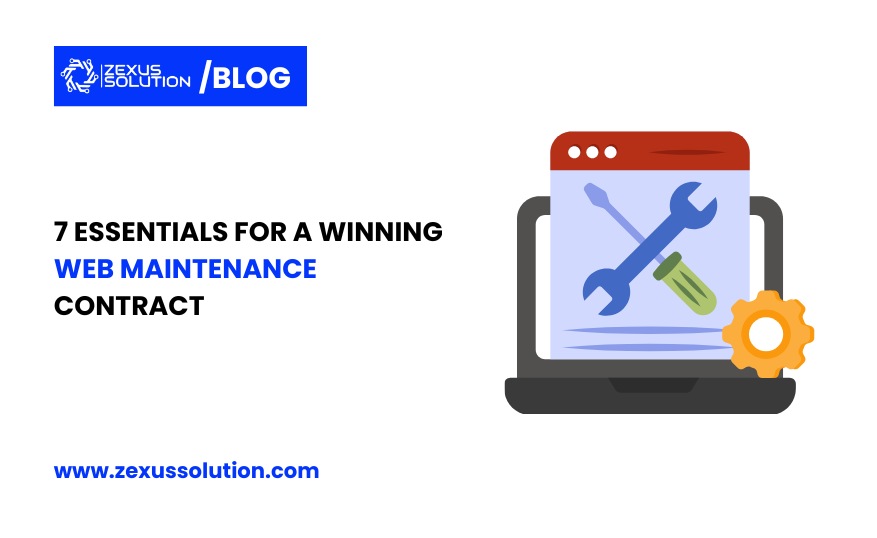Table of Contents
Many start-ups assume that investing in website maintenance is not essential. The website is designed and developed, what could go wrong now? Well, many things can go wrong. If a website is not maintained, it can become vulnerable to security breaches, leading to data loss or theft, which can damage your reputation and trust with users. In addition, outdated content, broken links, or poor performance can give a terrible experience to the user. This can drive potential customers away and harm your SEO ranking.
Therefore, it is important for every business, big or small, to have a web maintenance contract. With a well-defined contract, your website will be safe, updated, and fully functional, so there is little room for risks during unexpected downtime or security breaches. In addition, this would also provide a clear view of the scope of services, response times, and financial obligations between the involved business and the service provider. Web application maintenance services ensure that your company’s core business operations are diverted to professional digital asset managers whose responsibility lies in keeping the website up and running smoothly. This proactive approach not only manages to protect the business’ digital assets but also builds customer trust and satisfaction.
What is a Web Maintenance Contract?

A web maintenance contract is an agreement, signed between the owner of a website or business and a service provider to detail the terms and conditions governing the maintenance of any website. The two primary elements include detailing the service provider’s responsibilities in keeping the site functional, secure, and up-to-date and stating the expectations and obligations of the website owner.
Key Components of a Web Maintenance Contract
- Service Scope: This section describes precisely what work shall be done. Typically, services that a provider can perform will include:
- Upgrading periodic software (CMS, plugins, themes, etc.)
- Monitoring and maintaining security
- Data backup and restore
- Optimization of speed and responsiveness
- Bug fixing and troubleshooting
- Content: text, images, etc.
- Response Times: The terms of the website usually highlight the response time that is to be expected for categories of requests, so the web owner knows exactly how long he or she can expect a site maintenance problem to be responded to.
- Terms of Payment: This section defines just how much the web owner is to pay for the site maintenance services, including the periodicity of payment-say monthly, quarterly, or annually-and additional expenses for other services not in scope.
- Performance Metrics: Examples of KPIs can be included in the contract for assessing the efficiency or effectiveness of maintenance services provided. These may include average uptimes of websites, average page load speed, security incidents, etc.
- Confidentiality and Data Protection: A website entails sensitive data, and so the contract should therefore include what is termed as confidentiality and data protection clauses.
- Termination Clause: This portion outlines the mode and period of notice for termination, including the grounds for which the contract would be brought to termination.
- Review and Updates: Most service contracts contain review and update provisions that facilitate the freedom of flexibility by both parties to adapt to changing business requirements.
Purpose of Website Maintenance Contract

The primary function of a web maintenance contract is the clear detailing of the continuous support and management of a website, thereby avoiding possible misunderstandings between the website owner and the service provider, with the expectations of both parties then placed in alignment.
Importance in Businesses
The administration of websites through web maintenance contracts is very crucial to all businesses, from small-scale to large enterprises, for several reasons.
- Reliability: Makes the website up and running along with safety, which is just a tremendous boon to maintaining client trust and business credibility.
- Cost-Effectiveness: Prevents major problems from arising by nipping minor problems in the bud; thus saving the business potentially from money lost in the long run
- Focus on Core Business: Business owners will have peace of mind in their core operations while enjoying their website being efficiently managed and taken care of.
- Compliance: It ensures that the site meets levels as regarded by law and is recommended concerning all the privacy and protection of user data.
In a nutshell, a web maintenance contract is an important resource for ensuring that you get the best website maintenance services that will keep the website running effectively in a competitive digital environment.
7 Essentials for a Winning Web Maintenance Contract

Assuring that your website is receiving continued and efficient support cannot be complete without a strong maintenance contract. A written contract protects both parties to the agreement and indicates specifically what services are to be performed. These seven are critical essentials to include in a winning web maintenance contract with detailed explanations for each.
Scope of Services
Scope of services are the services a web maintenance provider is supposed to deliver. This will have a thorough description. It is aimed to eliminate any vague statements so that it may not create further confusion in the future. Specify and include details of software updates, and security monitoring, among other conditions. Details involved in the scope of services are:
- Upgrading the content management system and other plugins and themes to maintain compatibility and security.
- Scanning for malware, monitoring vulnerabilities, and conducting security audits for protection against cyber threats.
- How often and how do you backup data so that it may be restored in case of an incident?
- Things you will do to make your site faster and performance, such as image optimization, code minification, database cleanup, and others
- Defines how content changes will be handled, including blog updates, adding new products, and updates on the same page.
- Elaboration of the type of bugs that shall be fixed as well as the time required to do so in order to make the fixes.
Response Times and Availability
Elaborate the response times anticipated for the different types of support requests. This will reassure the client regarding the level of service expected. Consider including:
- Emergency Issues: Clearly outline what constitutes an emergency, for example, a website going down or a security breach, and what response time to expect (within 1 hour).
- Maintenance Requests: Agree to response times for routine requests, for example, minor changes like updating content, and response time within 24 hours.
- Hours of Availability: Clearly state support times, for example, Monday through Friday from 9 AM to 5 PM, or whether you can provide emergency support after hours or on weekends.
Payment Terms
Some of the best website maintenance companies outline financial terms in such a way that nothing can create future disagreements. For instance, whether payments are monthly, quarterly, or annual, and what amount is set. This must also include:
- Payment Due Dates: State when payments fall due, for instance, on the first of each month, and any grace periods provided.
- Additional Costs: Indicate how additional work outside of the scope will be addressed, such as the rate if a considerable amount of additional work is needed.
Performance Metrics
Make sure that your monthly website maintenance plans associate KPIs to evaluate the effectiveness of maintenance service delivery. In this way, outcomes will be accountable for achieving the standards set out with a yardstick to measure performance. Examples include:
- Uptime Monitoring: Maintain a percentage uptime, for example, 99.9%.
- Page Loading Time: Determine the specific page loading times for the most critical pages.
- Number of target/minimum security breaches per year.
Evaluate these metrics during routine performance reviews to confirm both parties are meeting their agreement.
Confidentiality and Data Security
The website data is sensitive, therefore, there needs to be the inclusion of a confidentiality clause. The confidentiality clause within the agreement would include:
- Data Management: Describe how client data will be protected and guarantee confidentiality
- Compliance: The company should be able to demonstrate compliance with any relevant data protection rules: for example for European GDPR, for Californian users’ CCPA. A statement to comply with all legal obligations about the processing and storage of customer data should exist.
- Non-Disclosure Agreement, NDA: You can attach or include a separate NDA, or incorporate it within the contract that discourages the party from releasing confidential information to third parties.
Termination Clause
A well-defined termination clause ensures the protection of both parties in the web maintenance package when the relationship needs to be ended. Therefore, it should ensure that there is a notice period on how much time must be given for termination such as 30 days, and it outlines the accepted grounds for termination, such as non-performance or breaches of contract.
- Financial Liabilities: Highlight the financial liabilities left open at the contract end, including service rendered to termination and outstanding support requests.
Periodical Review and Revisions
Put in place measures to have the contract remain valid and effective for both parties by introducing regular review mechanisms. This can be done in aspects of:
- Scheduled Meetings: Schedule regular meetings to meet and discuss performance, upcoming needs, and potential scope variations for service.
- Contract Update: Identify the procedure for updating the contract as the businesses evolve. This will involve mutual agreement for any update and update through an amendment.
Protect Your Online Reputation
In a nutshell, investing in a website maintenance plan for a website is very important in keeping it safe, working, and performing at its best. A solid contract provides clarity on what website maintenance includes, from regular updates and security scans, saving you valuable time to focus on growing your business. Making website maintenance a priority will protect your digital assets while making the user experience better and leading to greater success online.



Add a Comment